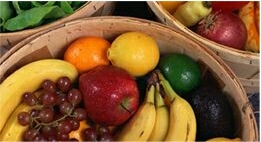
Cancer Diet: What is A Good Diet?
Healthy Diet and Cancer
According to the U.S. Department of Agriculture and the U.S. Department of Health and Human Services, the Food Guide Pyramid illustrates a good diet for most healthy Americans.
The goal is to include foods from the five different foods groups and maintain a balanced diet throughout the day. The focus of the diet should be from the base of the pyramid - grains, fruits, and vegetables. The number of servings decrease as you progress upward, with the top of the pyramid recommending fats, sweets, and oils be used sparingly.
And while there is no single "cancer diet" - a list of foods that is known to prevent cancer, the American Cancer Society suggests a varied assortment of healthy foods, emphasizing plant sources.
The Five Food Groups
The five food groups include grains and starches, fruits, vegetables, milk and dairy,
and meats and protein foods.

|
Fruits and Vegetables provide vitamins and minerals, which include antioxidants (cancer fighting compounds). Fruits and vegetables can be eaten raw, cooked, canned, or in the form of juice.
Meat and protein foods include beef, chicken, fish, pork, turkey, milk, eggs, yogurt, cottage cheese, peanut butter, dried beans, and tofu. These foods provide protein our bodies need to maintain strength and energy, fight infection, and heal itself.
Grains and starches include bread, pasta, rice, and cereal, and they provide our bodies with carbohydrates and B vitamins that our bodies use for energy.
Milk and dairy products provide us with protein, carbohydrate, vitamins, and the best sources of calcium, which is essential for healthy bones.
The American Cancer Society has created Nutrition and Physical Activity Guidelines , which list diet and exercise recommendations that may reduce the risk of cancer :
1. Eat a variety of healthful foods with an emphasis on plant sources.
2. Adopt a physically active lifestyle.
3. Maintain a healthful weight throughout life.
4. If you drink alcoholic beverages, limit consumption to 2-3 drinks weekly.
The cancer / diet relationship: The following are guidelines that may lower your cancer risk:
- Eat 5 or more servings of fruits and vegetables every day.
- 2-3 servings of whole grain bread, pastas, rice, etc. every day.
- Limit fat intake to 30% of calories (preferably less than or equal to 20% of calories) every day.
- Limit intake of simple sugars.
Healthy diet and cancer
When diagnosed with cancer, the dietary goals for most healthy Americans can drastically
change, especially during and after cancer treatments such as surgery, radiation
therapy, chemotherapy, biological therapy (immunotherapy).
Note: We strongly encourage you to talk with your health care professional
about your specific medical condition and treatments. The information contained
in this website is meant to be helpful and educational, but is not a substitute
for medical advice.
Clinical Trials
Search Cancer Clinical Trials
Carefully controlled studies to research the safety and benefits of new drugs and therapies.
SearchPeer Support
4th Angel Mentoring Program
Connect with a 4th Angel Mentor and speak to someone who understands.
4thangel.ccf.org
